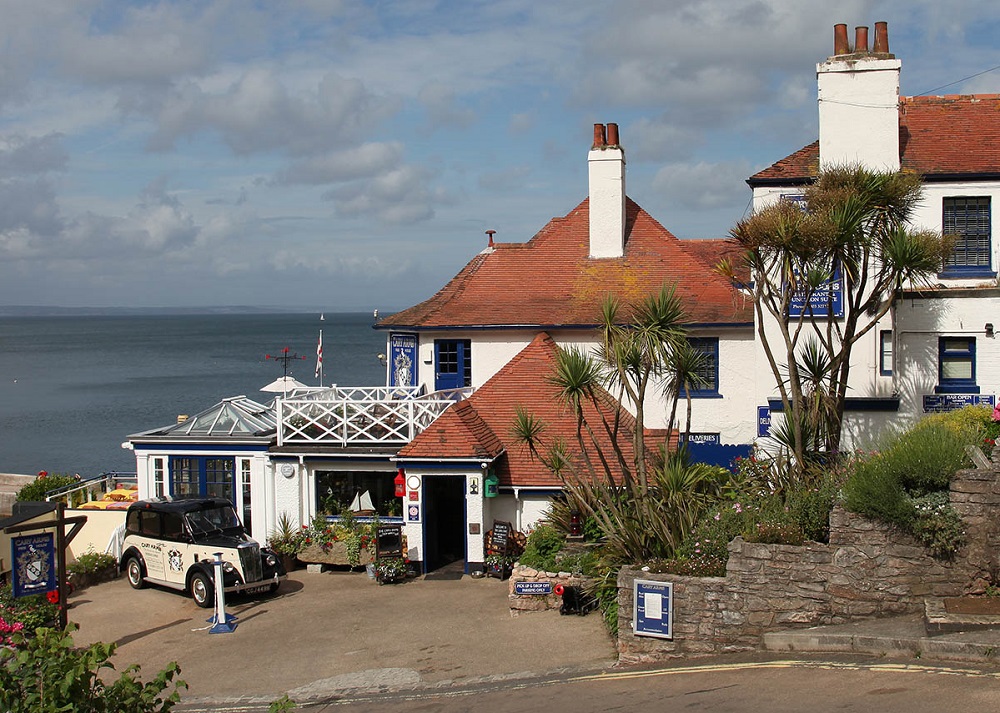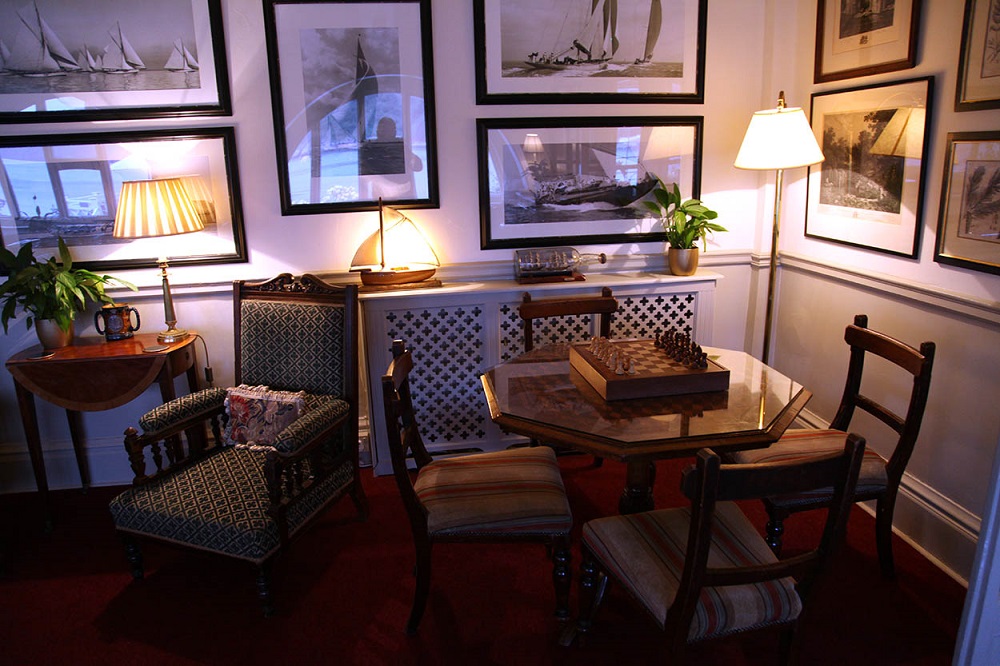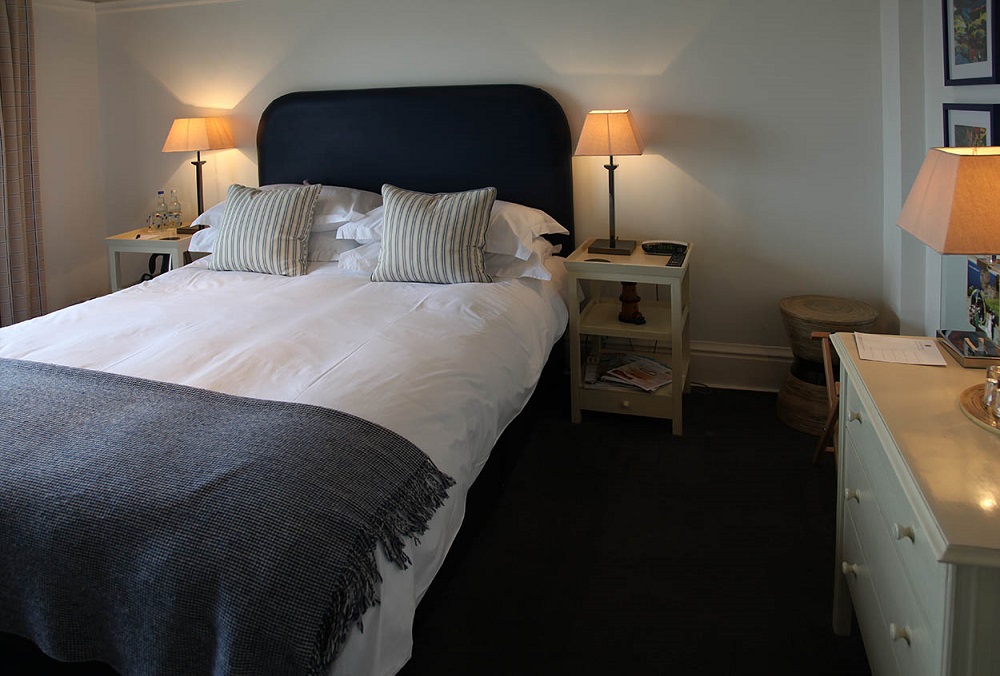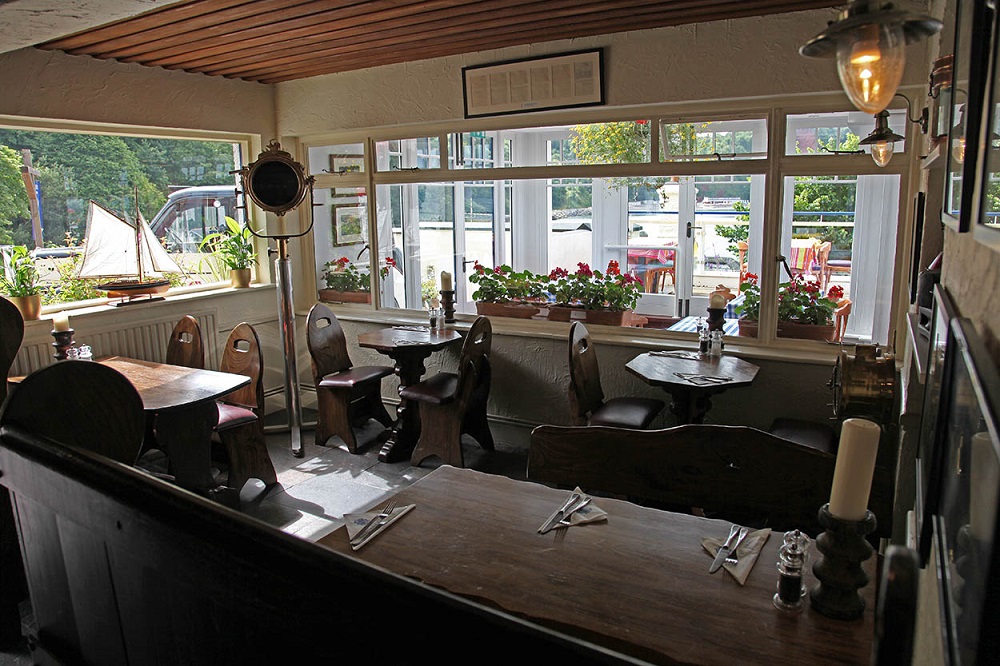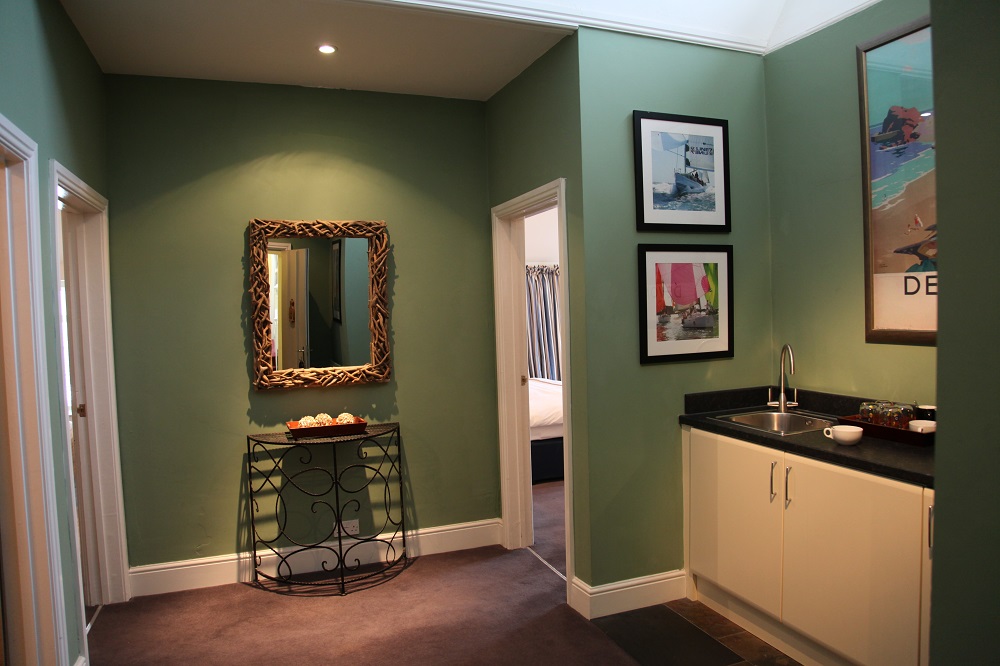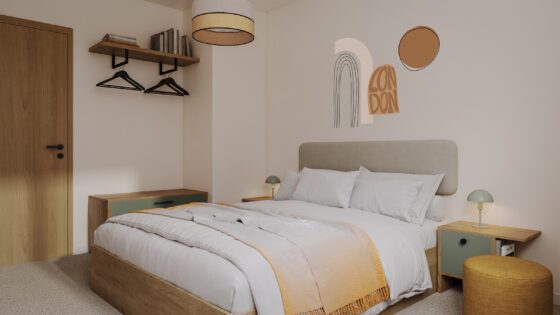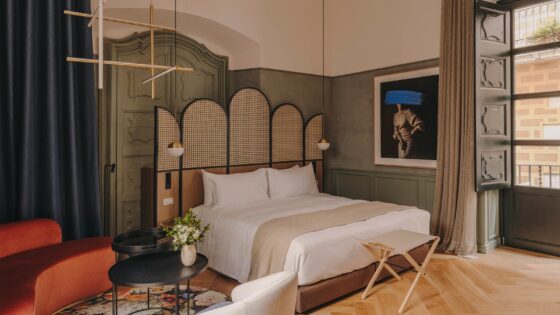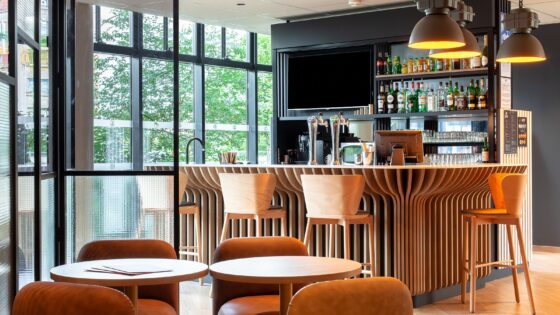Babbacombe is just along the road from Torquay – so close in fact that some people class it as Torquay suburbs, but it is not. My mother’s family are from around here and I played on the beach as a child, so the England deliberately evoked by this hotel is the England of my childhood. It is the England of childhood adventure and sophisticated adult pleasure. Classy and authentic, the hotel summons an English vernacular in a down-to-earth manner.
Owned by the de Savary family, the hotel is expanding with additional bedrooms being built and the spa expanded, but the existing 1920’s building has the grace of a bygone era; it serves cream teas, local ales and local foods.
The small harbour nearby shelters yachts and fishermen bring their catches straight to the hotel kitchens. It’s a place of cliff walks and choughs, seals and sailing boats, sand and ice-cream. What could be more English? The relaxed interiors reflect the nautical traditions of Devon, and posters and imagery play shamelessly on the collective memory that pretends the past is a better place than the present. Maintaining these myths is not easy alongside the demands of the 21st century traveller, but the Cary Arms performs the trick almost effortlessly.
This Anglo vernacular is exploited unselfconsciously with the skill of a master magician’s conjuring trick. The innocence of Devon perhaps, from whence local people drive to London and naively expect to be able to tour around the capital and park their car to view the attractions. Maybe the past is not being recreated here but is actually still alive and well? With it comes relaxed standards of service, staff that smile a great deal and have pride in place.
This is a place to have pride in too. Not only does it have the location in classical Devon seaside landscape beloved of the Pre-Raphaelites, a funicular railway to the cliff top along the beach, but it has the cliff walks, seals in the harbour, yachts and views, all of which have probably been largely unchanged since the hotel opened. Sensibly the owners have built on that foundation, respecting the past and building ‘with the grain’ both inside and outside the hotel.
Interior schemes are eclectic, appearing aggregated rather than designed and typically English exercises in comfort. The style emerges from the eclecticism, intended a reflection of individual obsession and collection rather than a boutique designer approach. This hotel has a personality because it is reflective of an individual’s personality. Thought has gone into creating definition of areas so the styling of the ‘pub’ part of the property is local and vernacular. The emphasis is on local materials in much the same way that the emphasis on food is on local. Walls are of local stone, traditional heating supplements the central system with log burning stoves, and the area outside is brought into play.
The definition between the hotel part and the pub part is clear, the balustrade immediately defining the more stylish hotel areas, separating and keeping them private from the pub/restaurant operation. This is cleverly done and the comfort created in both areas is created stylishly.
The hotel part harks back to another era. Slightly reminiscent of the 1930’s, the emphasis on comfort gives it a timeless English quality, a little like Babbacombe itself. The nautical theme emphasises this local link such as models of boats and images of the Americas Cup races unified, whereas the furniture looks like collected individual pieces. The hotel calls itself the ‘Inn on the Beach’ and indeed its gardens roll down to the shoreline. Maximising these is not just the walks but the ‘bandstand’ seating area above an artist studio, public and private lounging areas, a circular dining ‘pod’ for romantic couples and a hammock to hang out in.
The area is warmer than most of Britain and earns its sobriquet of the English Riviera with enough sunshine to add al fresco dining to the offer with confidence that for many months this will be a norm. For guests there is the delight of breakfast in the conservatory rather than in the pub environment if the weather mitigates against breakfast outside.
Devon cream teas and a relaxed environment with no bustle enhance the conjuring up of an earlier era the hotel is so good at creating. This is the English seaside resort of an earlier generation recreated with the creature comforts of the 21st century, including the internet. The creature comforts of the 21st century are reflected in the luxury treatment afforded in the bathrooms as well as the additional sybaritic pleasure of spa treatment rooms. The importance of this luxury to the hotel offering is reflected in the additional building under construction that will add further bedrooms and develop the spa offering more. The hotel may currently only have a small number of bedrooms but these are already extended by the offering for rental of a number of the village cottages as serviced accommodation.
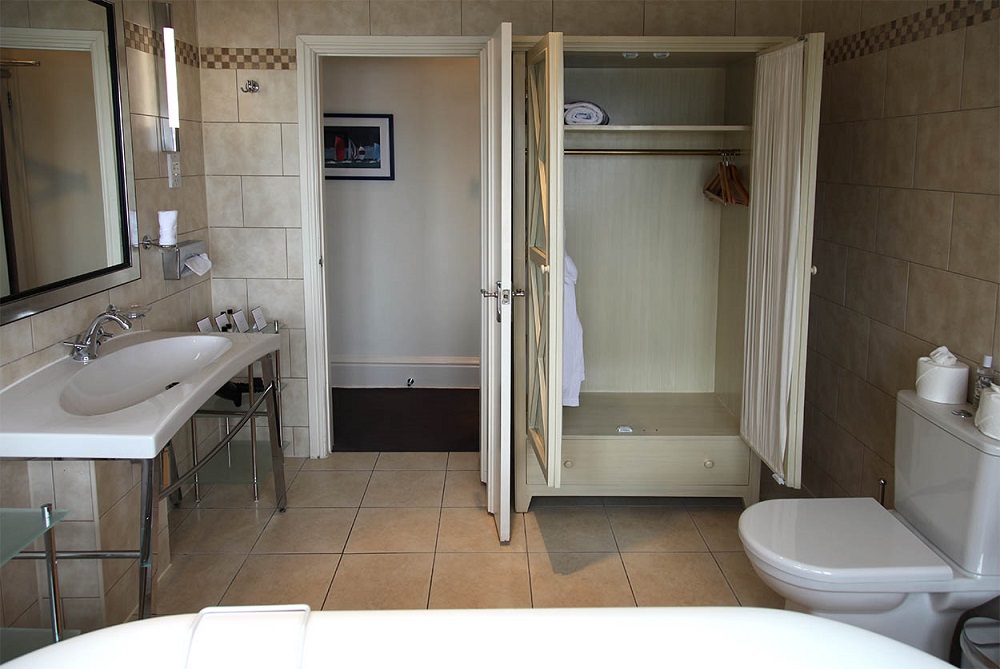
Nearly every bedroom has its own balcony with a sea view and the hotel also makes provision for guests to bring their dogs, supplying dog beds, dog bowls and even a dog menu in the restaurant. With the beach and cliff walks available this is a doggy paradise as well as one for the human guests.
The clever design – to make it so undesigned in look is a difficult trick for a professional designer – is relaxed in the bedrooms too. However everything that should be here is here, and if the fabric of the building needs some work (windows are painted shut for example) everything that you would find in a run of the mill four star you will find in this beautiful little Inn. A curfew operates on the terrace so that noise intrusion to the bedrooms is prevented, and as most are away from the pub part of the building, the only sound is the susurration of the wind and the sea. The shift from the pub design into the hotel design areas is simple and well done – not perhaps as well as the Alma, but that was an urban boozer and this is a piece of the past, so the lack of high style in favour of comfort is not a misjudgement here.
A baluster and simple rope serve to separate off the guest area, including access to the bedrooms, from the areas available for the pub guests. A similar gentle division separates off much of the outside seating area for sole use by hotel guests too.
There is a discreet area behind the building with loungers, a hammock and a small cabin used as an outside dining room and for weddings etc., bringing a little Caribbean style from de Savary’s properties there into this corner of Babbacombe. The main dining area is however, a little piece of Devon vernacular, stylishly done using local stone and again found ‘seafarer’ touches that key in to locality. It is a difficult balancing act keeping the pub feel whilst creating a sophisticated dining experience, something managed well in Shibden Mill, but if anything it is managed better here. Using the conservatory has enabled the creation of a light, pleasant breakfast dining area whilst the log fires creates a warm snug feel for those times when the weather is not sunny – and let’s face it, this is England and it does happen to rain here.
The unity in the interior created by the use of stone and the dark timber seats enhances the warmth of the space. It breaks into small areas allowing it to seat individuals or small groups in some privacy as well as creating the clatter of the busy bistro. With picture windows giving the views out, the spaces are not claustrophobic whilst the light and airy conservatory gives balance to the dark cosiness of the other dining areas. The overall feel is of an intimate embracing space, with the warmth of a traditional pub but enough sophistication to serve the hotel well. Similar to de Savary’s other property, the Old Swan and Minster Mill on the Windrush in some respects, this Inn on the Beach is if anything more successful at capturing that ‘Englishness’ that is obviously one of the sales strength of both properties.
I am fascinated by the vernacular. Strangely it seems strongest in Germany both the old East and the West (see NiederSachsen for example, whilst we seem to misfire with our awareness of it in the UK. The chains are concerned with brand image, selling a commodity product to defined, often very high, standards. Independent hotels seem to drift more to the kind of global ‘international’ image look rather than reflecting locality. This misses both the design strength of playing a local tune and the desire of overseas visitors to experience Britishness when here – in this case, the land of Drake, Devonian quality.
Why would anyone want to come here and feel that the location is not reflected in the interiors? As Mr. Hilton said, it is all about ‘location, location, location’. There is a difference between having a high standard, up to international levels, and being vernacular or localised. Both can be achieved. In his hotels, de Savary has recognised this and certainly in the case of the Inn on the Beach in Babbacombe, has gone a long way to succeeding.

